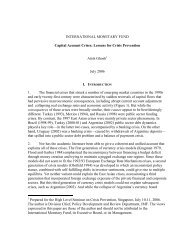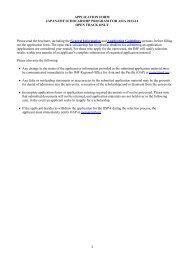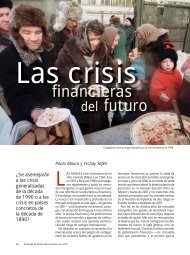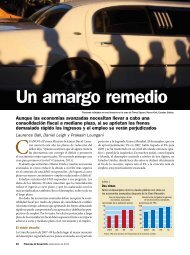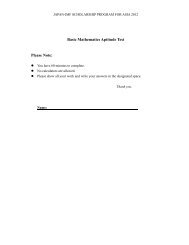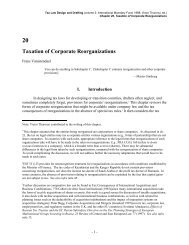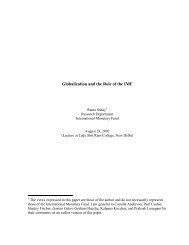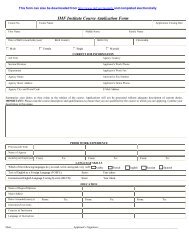Insolvency â why a special regime for banks? by Eva Hupkes ... - IMF
Insolvency â why a special regime for banks? by Eva Hupkes ... - IMF
Insolvency â why a special regime for banks? by Eva Hupkes ... - IMF
Create successful ePaper yourself
Turn your PDF publications into a flip-book with our unique Google optimized e-Paper software.
submit his or her own proposals. 70 The Canada Bank Act establishes a system where<strong>by</strong> the<br />
Superintendent may take control of the bank’s own assets as well as those under its<br />
administration. 71 Where the Superintendent has control of such assets, he or she may do all<br />
that is necessary or expedient to protect the rights and interests of the depositors and creditors<br />
of the <strong>banks</strong>. Dutch banking law authorizes the supervisor, De Nederlandsche Bank, to<br />
appoint a trustee to a bank, <strong>by</strong> whom all decisions taken <strong>by</strong> the management, board of<br />
directors and shareholders must be approved. 72 In Spain, the bank supervisor, which is the<br />
Bank of Spain, has the ability to place the management of a distressed bank under the control<br />
of appointed officials (interventores). 73 Any action taken without the prior approval of this<br />
official is considered null and void. 74 In Switzerland, the current proposal <strong>for</strong> an amendment<br />
to the Banking Act introduces the instrument of an “investigator” who can be appointed <strong>for</strong><br />
investigatory or monitoring purposes and, under certain conditions according to the mandate<br />
defined <strong>by</strong> the Swiss Federal Banking Commission (SFBC), can act in lieu of the bank’s<br />
managers or directors. 75 U.S. law establishes a particular <strong>regime</strong> to control management<br />
action, and defines in detail the types of transactions that become subject to authorization,<br />
should the bank become what is termed “undercapitalized” 76 or “significantly<br />
undercapitalized”. 77 Where a bank is qualified “critically undercapitalized” 78 it will no longer<br />
70 Id; see also Austria: Sec. 70 (2) 2 of the Banking Act. The appointed supervisor can prohibit<br />
“all bank operations that may increase the risks <strong>for</strong> the bank’s creditors.”<br />
71 Canada: Sec. 648 (1) (a) and (b) (i), (ii) of the Bank Act 1991, c. 46 (available via the<br />
Internet at http://laws.justice.gc.ca/en/B-1.01/text.html). Bank management is placed under<br />
the control of the Superintendent, and “no director, officer or employee of the bank has access<br />
to any cash or securities held <strong>by</strong> the bank unless a representative of the Superintendent<br />
accompanies the director, officer or employee, or the access has been previously authorized<br />
<strong>by</strong> the Superintendent or the Superintendent’s representative.” The Bank Act explicitly<br />
stipulates that ”the bank shall not make, acquire or transfer any loan or make any purchase,<br />
sale or exchange of securities or any disbursement or transfer of cash of any kind without the<br />
prior approval of the Superintendent or a representative designated <strong>by</strong> the Superintendent.”<br />
72 Netherlands: Act on the Supervision of the Credit System Sec. 28 (available in the Global<br />
Banking Law Database at http://www.gbld.org/downloads/The%20Netherlands/ASCS.pdf ).<br />
73 Spain: Law 26/1988 on the Regulation and Supervision of Credit Institutions Art. 31<br />
(available in the Global Banking Law Database at<br />
http://www.gbld.org/downloads/Spain/DICI.pdf).<br />
74 Id., Art. 35.<br />
75 See supra note 35.<br />
76 For the definition of “undercapitalised”, see 12 USC § 1831o (b) (C).<br />
77 For the definition of “significantly undercapitalised”, see 12 USC § 1831o (b) (D). As such,<br />
a prior written approval from the Federal banking agency is necessary ”to pay any bonus to<br />
any senior executive officer or to provide compensation to any senior executive officer at a<br />
rate exceeding that officer's average rate of compensation (excluding bonuses, stock options,<br />
and profit-sharing) during the 12 calendar months preceding the calendar month in which the<br />
institution became undercapitalized.” 12 U.S.C. § 1831o (f) (4) (A).<br />
78 For the definition of “critically undercapitalised”, see 12 U.S.C. § 1831o (b) (E).<br />
16





